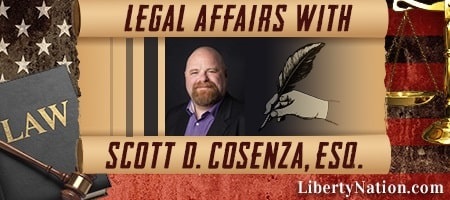With the US Supreme Court ruling Wednesday, October 30, that Virginia can proceed with purging noncitizens from its voter rolls, other states seem to be eyeing the results and making plans. Was the one-page order the starting pistol for cleaning up ineligible voters? Or are more politics and perception at play?
We spoke with Liberty Nation News Legal Affairs Editor Scott D. Cosenza to figure out what will happen between now and Election Day – and what might come after.
Dissent in the Ranks
Mark Angelides: Scott, what started this battle over voter rolls in Virginia?
Scott D. Cosenza: Governor Glenn Youngkin, a Republican, directed that the Virginia Board of Election send removal notices to local election boards for suspected noncitizens who do not have the right to vote.
These people either declared their noncitizen status at the DMV or filed any number of documents with the DMV demonstrating noncitizen status. Their names were passed through a state database and checked against a Department of Homeland Security’s database to determine whether they had subsequently obtained citizenship. If not, the state board ordered their removal from the election rolls.
MA: Can you give us the timeline of how this ended up before the Supreme Court and an indication of why it arrived just a few days out from Election Day?
SDC: The Biden administration and a progressive coalition group sued Virginia election officials to have them stop the removals. The suit claimed the state violated the Quiet Period Provision of a federal law called the National Voter Registration Act (NVRA). It requires that any state “program” whose purpose “is to systematically remove the names of ineligible voters from the official lists of eligible voters” based on the failure to meet eligibility requirements must halt “not later than 90 days prior to” any election for federal office.
A Biden appointee to the federal bench granted the president and the progressives an injunction, which prohibited Virginia from removing those it deemed ineligible. State officials then appealed to the Fourth Circuit Court of Appeals, which declined to reverse the lower court order. The Supreme Court did, however, over the objections of Justices Sonia Sotomayor, Elena Kagan, and Ketanji Brown Jackson. Virginia may now resume culling these people from registered voter lists.
MA: When this news broke, one of the first things you made clear to me was this could end up back at SCOTUS. Does this signify that whatever ramifications this order has are more for future elections rather than the one next week?
SDC: The groups challenging Virginia’s actions still need to prove their case in court. They won an initial injunction, but that would stay in place only until a regular trial is conducted. The timeline puts it well after the presidential election; however, it may not be at the top of the headlines when it’s heard. No matter who loses, we should expect they would appeal, up to and including back to the Supreme Court.
MA: I can fathom why the more conservative justices granted the petition, but I’m not sure I understand the motivation of the liberal bloc. I’m sure it would be speculative, but can you illuminate from what legal position they might view this?
SDC: It’s not that hard to see the case from the other side. I’m not talking about thinking it is okay for noncitizens to vote. I mean instead that the NVRA is constitutional and that these actions by Virginia officials violate a provision of that act. Therefore, the plaintiffs are entitled to an order to stop them. The three liberal justices let us know they would have denied the claim, but we don’t know if any of the other six would have – this was an order without published opinions or a public vote.
Virginia Slim Margin?
MA: It’s my understanding that even if some of the voters do turn out to have the right to vote, they can still get a provisional ballot on Election Day. So my question is, will this decision impact the final result?
SDC: Every little bit helps or hurts, I suppose, depending on your perspective. Both sides are fighting on every front they can manage.
 MA: There have been numerous stories over the last few weeks of various states trying to clean their voter rolls. Is the process for that a state decision, and why does it feel so last-minute? And what other states are seeking a remedy?
MA: There have been numerous stories over the last few weeks of various states trying to clean their voter rolls. Is the process for that a state decision, and why does it feel so last-minute? And what other states are seeking a remedy?
SDC: Pennsylvania Republicans are also looking for relief from the high court, appealing a state supreme court decision over provisional balloting when a mail-in ballot is deemed deficient. That is a state decision, as are the mechanisms by which authorities tidy up voter rolls. The fixed date of the election allows any party to start off with a credible claim of urgency when bringing a matter to court this close in. That’s part of the reason it feels so last minute.
MA: It seems there is a constant battle between the left and right regarding access to voting and election security. One would assume that the rules, laws, and practices are set in stone. Why aren’t they?
SDC: We don’t have a presidential election; we have 50! Well, more than that, with DC and other non-state jurisdictions that can vote for president. Nevertheless, elections are state-level affairs. Many states have scandal-free election practices and are widely understood to be fair dealing. States without such practices have done so by choice.




